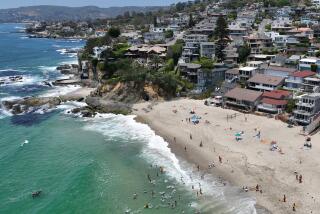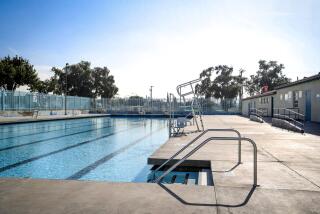Surf City Is Running Out of Lifeguards
- Share via
A lifeguard shortage in, of all places, Huntington Beach (a.k.a. Surf City) prompted an unprecedented summer tryout recently, and the results were not so good: About half a dozen prospects had to be rescued during a half-mile pier swim.
“You should see some of the people we’re getting nowadays,” said Mike Eich, who for two decades has been training lifeguards to handle some of the roughest waters off the Pacific Coast. “One guy showed up with cutoff jeans hanging below his knees. Others couldn’t believe that they had to swim the whole way around the pier.”
One enthusiastic but nonathletic hopeful was asked to jot down her swim experience: “I have none. But I watched ‘Baywatch’ and I look good in a bikini.”
Huntington Beach is not alone. Numerous Southern California agencies are, for the first time, feeling the same pinch, which has been a problem on the East Coast for years. Some stretches of Connecticut’s state beaches are unsupervised, New Orleans has to stagger the opening of its city pools because it lacks lifeguards, and New York City is using “Baywatch” actors in public service announcements to attract recruits.
In California, Orange County lifeguard officials say that they could be in a crisis mode later this summer because the ranks of lifeguards are depleted. San Diego has mailed personal invitations in an effort to recruit candidates. The state, which provides lifeguards at state beaches, is in the same boat.
And it is not just the number of candidates that is down. The quality of lifeguard candidates has sunk too; the vast majority of candidates flunk out. Of 129 people who attended a recent tryout at Huntington Beach, only 22 were offered positions.
“We’re training a lot more and failing a lot more,” said Mike Silvestri, a state lifeguard instructor for 22 years. “Lifeguards used to put themselves through college with this job, but not anymore.”
Part of the explanation is that year-round swimming and water polo programs have siphoned away the most talented. Also, today’s teenagers enjoy an abundance of recreational choices and no longer find learning to swim well a priority. Above all, though, is the overriding reality that lifeguards’ pay is low to mediocre, and a thriving economy has opened up jobs that pay as much as lifeguards earn or often more, and demand none of the physical intensity or responsibility that goes with tower duty.
All of this is coming at a critical juncture. Although the odds of a beachgoer drowning are very slim--1 in 18 million, according to the U.S. Lifesaving Assn.--overworked lifeguard officials throughout Southern California worry that they may not have enough guards for a heat wave or big surf from late August through Labor Day.
“In about mid-August, we could be in a major crisis here,” said Mike Broussard, a state lifeguard trainer in south Orange County. “That’s when our coast gets the big south swells and when our experienced lifeguards leave to go back to school.”
Lifeguard officials say that the public’s safety will not be compromised, although lifeguards will be working overtime and on their days off. “We’re 10 people short,” said Huntington Beach Lifeguard Capt. Steve Seim. “But safety will never be jeopardized. If need be, everybody will get on a tower, and I mean everybody, including me.”
Lifeguard captains today say that they find themselves with a much younger and less experienced work force.
Several years ago, California dropped its age requirement from 18 to 16 to avoid a potential age discrimination issue. “This has forced us to do a lot more training because there aren’t too many 16-year-olds mentally prepared to do the job,” Silvestri said. “I know it sounds harsh, but they don’t make ‘em like they used to.”
Usually, the state needs to hire only 60 or 70 new lifeguards each year, but a big shortage this year forced it to hire 130 recruits to reach its full force of 650.
Rookie guards who in years past would work only 20 hours a week are being put in towers immediately after training, requiring experienced lifeguards to play larger supervisory roles.
San Diego, whose candidate pool has dropped considerably in recent years, faces an acute shortage of Spanish-speaking lifeguards. “We can’t even get them to try out with personal invitations,” said San Diego Lifeguard Lt. Brant Bass.
In Northern California, Oakland officials believe that they have to do something different; they had to cancel a lifeguard class for lack of interest.
“Not enough people signed up,” said Ferdinand Sioteco, the city’s aquatics director. “We’re still looking for lifeguards.”
If the shortage continues, the city is planning to open a lifeguard academy during the winter. The only qualification is “you have to swim,” Sioteco said. The city will train potential lifeguards and waive the $135 fee.
The one place that seems immune to the shortage is Los Angeles County, where the lifeguard force is protected by a strong union. And although the average starting pay for lifeguards in Southern California is $11 an hour, Los Angeles County pays $16.28.
Lifeguard shortages have been a problem for cities and states on the East Coast in recent years, and that remains the case.
In Connecticut, two miles of the state’s five miles of public beach along Long Island Sound are not supervised by lifeguards.
“You can make more money as a waiter in a restaurant or working at a local outlet mall here. And at the mall, you can get 20% off on clothing,” said Bill Mattioli, the water safety program coordinator for Connecticut’s Department of Environmental Protection.
New York City turned to TV’s “Baywatch” actors, who extolled lifeguard work in public service announcements. But even that did not work; when the city could hire only 900 qualified guards a year ago (it needed 1,000), it had to close off pool areas and provide limited lifeguard service along the city’s 14 miles of beach.
The city had more success this year after it began advertising in subways guaranteeing jobs for individuals who passed the 40-hour lifeguard training course. But it remains a tough sell for young people who prefer computer strokes to breaststrokes.
“They prefer to get carpal tunnel syndrome rather than sunburn,” said Alan Moss, New York City Parks and Recreation deputy commissioner.
Indeed, from a recruit’s perspective, being a lifeguard is not the easiest of summer jobs.
Take Kyle Tague, 18, of Huntington Beach, who did his lifeguard training Easter week when the ocean water temperature was in the low 50s.
“On the day we had to do the pier jump, the water was 52 degrees,” he said. “It’s overcast, sprinkling and there’s a howling wind with a wind chill factor of 31 degrees. And, we are in our trunks shivering while hanging onto a ladder trying to climb back up.
“I was asking myself, ‘Do I really want to go through this?’ ”
But Tague survived. He was hired and two weeks ago rescued a bodyboarder who suffered a seizure and was pulled from the surf unconscious. “That’s rewarding. How many desk jobbers can say they did that?” he asked.


